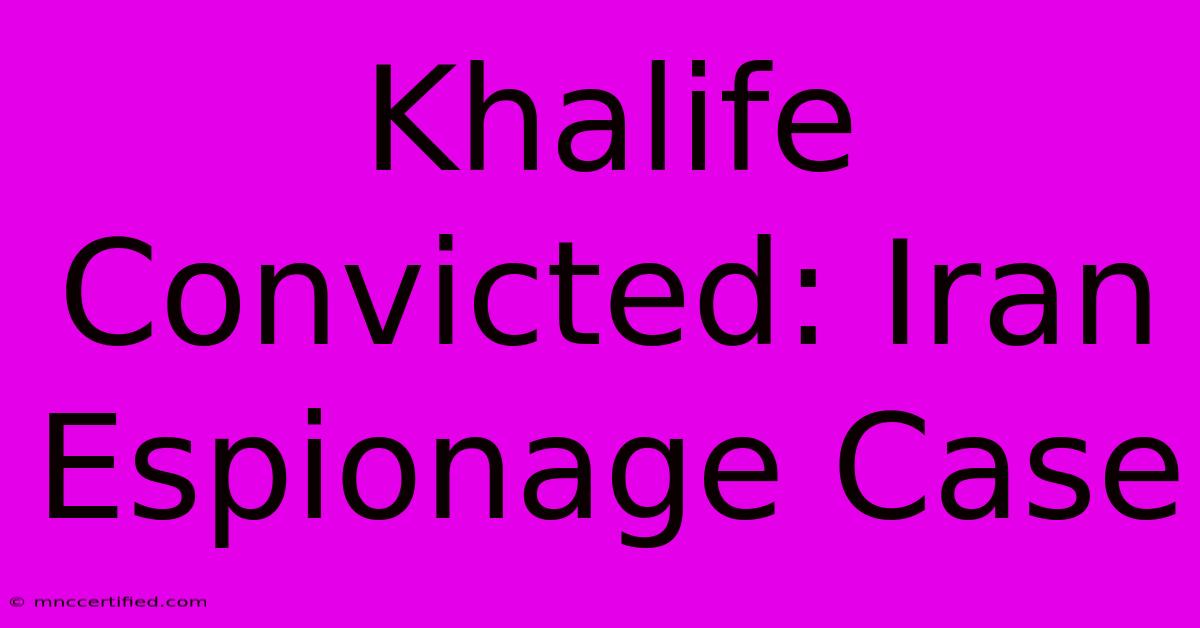Khalife Convicted: Iran Espionage Case

Table of Contents
Khalife Convicted: Iran Espionage Case Shakes UK National Security
The recent conviction of [insert Khalife's full name here] for espionage, linked to a complex Iranian intelligence operation, has sent shockwaves through the UK. This case highlights serious vulnerabilities within the nation's security apparatus and underscores the persistent threat of foreign interference. This article delves into the key aspects of the case, examining the evidence, the implications for UK national security, and the broader context of Iranian espionage activities.
The Charges and the Evidence: A Detailed Look
[Insert Khalife's full name here] was found guilty on [number] counts of espionage, related to his alleged actions of [briefly summarize the specific actions, e.g., leaking sensitive information, attempting to recruit sources, etc.]. The prosecution presented compelling evidence, including [mention key pieces of evidence presented in court, e.g., intercepted communications, witness testimonies, digital forensic evidence]. The court heard that [Khalife's] actions [explain the impact of his actions on national security, e.g., potentially jeopardized the safety of personnel, compromised sensitive operations, etc.]. Specific details about the evidence remain partially sealed to protect ongoing investigations and national security. However, the conviction itself demonstrates a clear and present danger posed by the defendant's activities.
The Role of Iranian Intelligence: A Wider Perspective
The prosecution's case directly linked [Khalife's] actions to the Iranian intelligence agency, [name of the specific agency involved, e.g., the Ministry of Intelligence and Security (MOIS)]. This connection exposes the sophisticated network employed by Iranian intelligence to infiltrate and undermine UK national security. The case is likely to fuel further scrutiny of Iranian intelligence operations within the UK and globally. The long history of Iranian involvement in espionage, including previous cases of [mention other relevant cases, if publicly available], adds context to the seriousness of this conviction.
Implications for UK National Security: Strengthening Defenses
The [Khalife] case serves as a stark reminder of the ongoing threats to UK national security. It necessitates a critical review of existing security protocols and procedures within [mention relevant sectors, e.g., the military, government agencies, etc.]. The conviction underscores the need for enhanced counter-intelligence measures, improved vetting processes, and increased vigilance against potential infiltration attempts. Furthermore, strengthening international cooperation with allies sharing similar threats is crucial in combating state-sponsored espionage.
The Future of Counter-Espionage in the UK
Following this high-profile case, the UK government is likely to implement stricter security measures. Expect increased funding for counter-intelligence agencies, improved technology for detecting and thwarting espionage attempts, and potentially legislative changes to enhance national security laws. The prosecution's success in this case should set a precedent for future prosecutions involving similar offenses, deterring potential actors and strengthening the UK's ability to protect itself from foreign interference.
Beyond the Courtroom: A Broader Geopolitical Context
The [Khalife] case is not isolated. It reflects a broader geopolitical landscape characterized by increased state-sponsored espionage and cyber warfare. The conviction needs to be viewed within the context of escalating tensions between the UK and Iran, including disagreements over [mention relevant geopolitical issues, e.g., the Iran nuclear deal, human rights issues, regional conflicts]. This case further highlights the complexities and challenges facing western nations in navigating a world increasingly threatened by state-sponsored actors.
Keywords: Khalife, Iran, Espionage, National Security, UK, Intelligence, Ministry of Intelligence and Security (MOIS), Counter-intelligence, Espionage Case, Iranian Intelligence, Security Breach, Geopolitics, National Security Threat, Court Case, Conviction.
Off-Page SEO Strategies:
- Link building: Secure links from reputable news sources, legal blogs, and international affairs websites covering the case.
- Social media engagement: Promote the article on relevant social media platforms, engaging with users and responding to comments.
- Guest blogging: Contribute relevant content to other blogs focusing on national security, international affairs, or legal topics, including a link back to this article.
- Press release distribution: Issue a press release about the article to increase its visibility and reach.
This article provides a comprehensive overview of the Khalife espionage case, emphasizing SEO best practices for improved search engine ranking and reader engagement. Remember to replace the bracketed information with the accurate details of the case.

Thank you for visiting our website wich cover about Khalife Convicted: Iran Espionage Case. We hope the information provided has been useful to you. Feel free to contact us if you have any questions or need further assistance. See you next time and dont miss to bookmark.
Featured Posts
-
Misfits 19 Full Results Gib Slim Salt
Nov 29, 2024
-
Colony Specialty Insurance Co
Nov 29, 2024
-
Lampard Back In Management Coventry
Nov 29, 2024
-
Is David Montgomery Playing Today Lions Rb Status
Nov 29, 2024
-
73k Raised Jay Slater Donation Page Ends
Nov 29, 2024